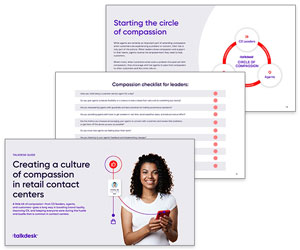What is Emotional Intelligence?
Emotional Intelligence (EI), also known as ‘EQ’ (to parallel IQ), describes a person’s ability to empathise, communicate and influence. The skillset implied by EI is important to contact centre staff, both for customer service, to understand and resolve, and sales, where the emphasis is on persuasion.
There are numerous ways a focus on Emotional Intelligence could add value to a business, which many studies have outlined. However, there is some disagreement about exactly what EI covers, and what consequences might emerge from an exaggerated focus on it as a metric for success.
The most common types of Emotional Intelligence in a contact centre environment are:
- Empathy
- Rapport building
- Resilience
- Listening skills
- Internal motivation
The Potential Benefits of Emotional Intelligence
The central benefit of high EI is the individual’s capacity to foster a sense of connection with others. Broadly speaking, people are receptive to the influence of those they consider to be ‘Like Me’. Those with high EI, having a less narrow view of what being ‘Like Me’ means, are able to relate to a greater variety of people.
EI is also associated with a capacity to regulate personal feelings and maintain control in situations which others find difficult. This is useful during the hostile interactions which are a fact of life in customer service. Self-regulation can also increase resilience to dealing with a high volume of interactions.
This applies to both customer interactions and interactions with other staff. Employing people with high EI may lead to greater cohesion, an amiable working environment, and leaders who understand the issues their staff face. This boost to staff well-being can encourage employees to stay longer in their post; any factor that can limit the high attrition rate faced by the contact centre industry can become a competitive edge.
One of the most important attributes is the ability to learn from mistakes. High EI candidates take ownership of their mistakes rather than blaming external factors or other people. By recognising error, employees have the opportunity to grow from them.
Recruiting for Emotional Intelligence
Increasingly, customer-facing industries are prioritising EI as a trait to identify in prospective staff. While expanding a candidate’s technical skills or process knowledge is quite straightforward, developing EI is seen as a complex task that few businesses are equipped for.
Recruiting for EI begins with how the role is advertised. Rather than just listing a level of education or experience, recruiters should consider including the kind of behaviours that are associated with the role. These might include traits such as negotiation, empathy and persuasiveness.
There are various strategies for measuring EI, most taking the form of personality tests that candidates complete at the application stage. Interviewers can home in on these traits by asking questions about the emotional experience of previous jobs.
Interviewees are often asked to describe a time when they hit a target or completed a project. Similarly, they can be asked to describe occasions when they correctly interpreted the feelings of a customer or colleague, how they knew, and what they did to adapt.
Of course, the interviewers themselves should also display reasonable EI and be able to discern real EI from confidence. Although these traits are often related, they are by no means the same thing.
Author: Jonty Pearce
Published On: 30th Sep 2016 - Last modified: 26th Apr 2022
Read more about - Definitions, Emotion, Empathy, Rapport
















